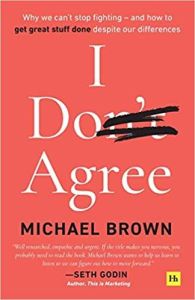Únase a getAbstract para acceder al resumen.

Únase a getAbstract para acceder al resumen.
Michael Brown
I Don’t Agree
Why We Can’t Stop Fighting – and How to Get Great Stuff Done Despite Our Differences
Harriman House, 2020
¿De qué se trata?
Differing points of view are inevitable, but that doesn’t mean humanity is doomed to disagree.
Recommendation
From childhood conflicts to boardroom brawls, it seems humanity is hardwired for heated conflict. But does people’s propensity to disagree spell doom to collaboration and cooperation? Not at all, argues digital marketing expert Michael Brown. In this highly readable book, Brown delves into the science and sociology of interpersonal conflict. Using examples he draws from a rich array of experts as well and his own personal experiences, Brown offers practical steps for understanding and solving key obstacles to consensus.
Summary
About the Author
Michael Brown is a founder and long-term managing director of creative industries businesses. He guided his last venture, MKTG, to become an international marketing organization with 32 offices in 20 countries.

















Comment on this summary